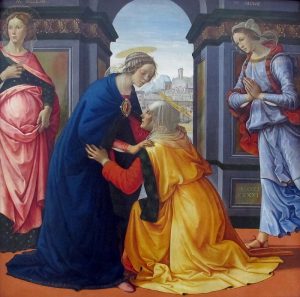Thoughts on Sunday’s Lessons for Dec. 17, 2023 (Advent 3B)

Magnificat: La Visitation (1491), tempera painting on panel by Domenico Ghirlandaio (1448-1494). The Louvre, Paris. (Click image to enlarge.)
First Reading: Isaiah 61:1-4, 8-11
On the Third Sunday of Advent it is customary to light the one pink candle on the Advent wreath, a hint of rejoicing in a season that we otherwise associate with preparation and expectation. Now our Lectionary readings for Advent shift from the fire and upheaval of an apocalyptic Judgement Day toward a different kind of expectation: A joyful hope that anticipates God’s restorative justice coming with the Messiah. In our first reading, the Prophet Isaiah – writing words that Jesus will later read and declare fulfilled in his presence when he speaks in the synagogue at Nazareth – tells the people that God will comfort all who mourn. God’s good news will come to the poor, the oppressed, captives and prisoners, turning them from mourning to gladness.
Psalm: Psalm 126
Just as Isaiah told the people in exile of God’s promise that justice and righteousness would be restored, here the Psalmist sings that God’s promise has been fulfilled. God has indeed restored the fortunes of the Temple on Mount Zion, the Psalmist exults. Throughout this short Psalm’s seven verses we hear shouts of laughter, joy, gladness, or praise. God has been good, the Psalmist sings. God has turned the people’s tears into songs of joy; their weeping into a bountiful harvest.
Alternate Psalm: Canticle 15
The Magnificat, the deeply meaningful Song of Mary (Luke 1:46-55), may be sung as an alternative to Psalm 126 on this day. Mary sings this powerful song as she greets her relative, Elizabeth. Elizabeth, who is pregnant with John the Baptist, feels the infant move with joy inside her when Mary comes in. Elizabeth declares Mary the blessed mother of God, full of grace. In response, Mary sings these startlingly radical verses that echo the Isaiah passage and foreshadow Jesus’ own teaching. These are liberating verses of distributive justice. Mary praises a God who scatters the proud, casts down the mighty, and sends the rich away hungry, while filling the hungry with good things.
Second Reading: 1 Thessalonians 5:16-24
Paul concludes his short first letter to the Thessalonians with themes consistent with those that we heard in the first readings from 1 Corinthians and 2 Peter on the first two Sundays of Advent. He urges the people to rejoice always, pray unceasingly, and give thanks for all things, staying faithful and filled with the Spirit. Hold fast to the good and abstain from every kind of evil, he urges them, so they will be ready, “sound and blameless,” when Jesus returns.
Gospel: John 1:6-8,19-28
Following the story of Jesus with John the Baptist in Mark’s Gospel last Sunday, we now turn to the vision of John the Baptist as told in the Gospel according to John. This version makes no mention of the Baptist’s attire or his dietary preferences. Rather, it quickly moves into a tense scene in which the Temple authorities, worried about the noisy crowds surrounding John, want to know just exactly who John is. John replies that he is not a new prophet; nor is he Elijah. Repeating the Isaiah verses that we heard last week, John declares himself the voice crying out in the wilderness, calling on the people to make straight the way of the Lord. He baptizes with water, John says, to make way for the one who is coming after him, who is so much greater that John is unworthy to untie his sandals.
